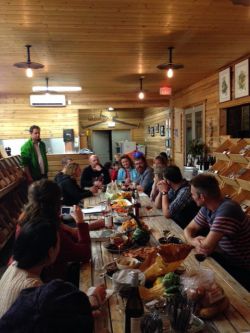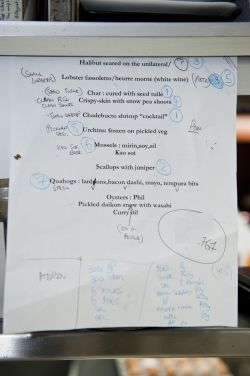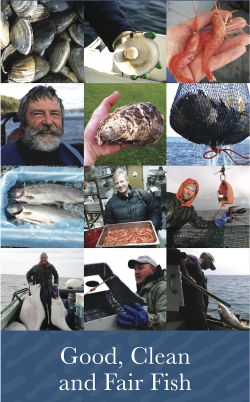Halifax Media Co-op
News from Nova Scotia's Grassroots
Launching ‘Slow Fish Canada’, by Sarah Ebel and Dave Adler
This blog was originally posted at Small Scales, the excellent East Coast fisheries blog administered by the Marine Issues Committee of the Ecology Action Centre.
Slow Food. It’s a simple, elegant concept- one that has been around for over 20 years. Started in the late ‘80s as a tongue-in-cheek protest to fast food (and fast living), Slow Food has grown into an international movement that celebrates and supports small-scale food systems.
With over 1,500 chapters in countries all over the world, the Slow Food movement is as varied as the countries where it takes place. However, all Slow Food campaigns are grounded in three main tenets: Good, Clean and Fair. The movement aims to promote and support small-scale food production by bringing consumers into the equation not just as beneficiaries, but as “co-producers”. The idea is that both consumers and producers hold active and important roles in ensuring the future success of small-scale farms- along with the value chain partners connecting the two.
Sound familiar? It should. Because the same is true of small-scale fisheries.
The Slow Fish campaign was born in the mid 2000s to draw attention to small-scale fisheries and the communities that rely on them. A fast-growing global network, there are now active and diverse Slow Fish campaigns in over 20 countries. In general, Slow Fish aims to “promote artisanal fishing and neglected fish species and inspire reflection on the state and management of the sea’s resources.”
Surprisingly new to Canada, Slow Fish Canadaformed officially last spring as a national campaign of Slow Food Canada. A small (but mighty) group of fisheries advocates across the country worked together to designate October as Slow Fish Month. This involved hosting a dazzling array of events from Saint John’s to Vancouver Island. From local seafood dinners and community conversations, to educational talks by fisheries scientists, to film screenings and cooking workshops, no two events were the same. But they all centred around a common theme: the importance of sustainable small-scale fishing in Canada.
Slow Fish Month kicked off in Saint John’s Newfoundland. After five days of talks and panel discussions aimed largely at global seafood commodity markets at the World Seafood Congress, a Slow Fish dinner and community discussion was a welcomed reprieve for those engaged in local, small-scale fisheries. Co-hosted by Too Big to Ignore, theEcology Action Centre and Food Security Network of Newfoundland and Labrador, the event created a space for discussions about sustainability, local seafood access, and prospects for small-scale fisheries and coastal communities in Newfoundland and Labrador.
Held in The Rocket Room, Chef Darryl Hammond’s menu included Artic char from Nain, cod from Placentia Bay, snow crab from the Southern Shore, and salt cod fish cakes. After the meal, Susanna Fuller of the Ecology Action Centre, asked, “How do we de-commodify fish, and fishermen? We are extremely lucky to have 10,000 owner-operator fishermen in Atlantic Canada. It’s like having 10,000 small businesses who work and live in our communities. We have to start thinking about how we support them, and how our support leads to stewardship of our oceans.”
Tom Best, a fisherman and president of the Petty Harbour Cooperative also highlighted the importance of our small-scale fisheries. He shared an inspiring story about how small-scale fishermen and workers in the coop have been able to incorporate a conservation mindset into a successful cooperative business that has been catching, processing, and selling sustainable local seafood for many years.
Slow Fish advocates also gathered and engaged in lively discussions over a local seafood dinner on Vancouver Island. Local fisherman Gregg Best spoke about his family seafood business, Cowichan Bay Seafood. Fishing and marketing Humpback Shrimp, a by-catch of the Spot Prawn fishery, Gregg plays an active role in management decisions, and the Best’s business in Cowichan Bay is the first area in North America to be declared a Città Slow. At the same time, Chef Oliver Kienast from Wild Mountain and Salty Andrew from Vancouver Island Salt served seared, brined local Qualicum scallops, locally farm-raised mussels in kelp broth, and local by-catch Humpback shrimp. (A snapshot of the evening as recorded on twitter and Facebook can be found here.)
Meanwhile in Toronto, Slow Fish members held the first ever “Caviar Roe Down.” Local chefs shared their favorite roe preservation recipes, celebrating our rich Canadian history and nearly forgotten set of methods to preserve the roe of seasonal local fishes. Currently, most freshwater fish roe is either discarded or directed to the pet food industry- a wasteful practice Slow Fish advocates hope to reverse. Hosted by Jamie Drummond from Good Food Revolution, and facilitated by Joel MacCharles from Well Preserved and Kristin Donovan from Hooked, Inc. the Roe Down was judged by a panel of guest judges, including Jim Cuddy! It was a tremendous success, and members hope to make it an even bigger event next year.
Of course, several Slow Fish events were also hosted across the Maritimes. Throughout October, Nova Scotia bustled with celebration and discussion about the significance of small-scale fishing to their communities. Several Halifax restaurants featured Slow Fish specials for the month, while Slow Food members Craig Flinn, Brady Muller, and Peter Jackson cooked up delicious local seafood recipes at thePark Avenue Community Oven in Dartmouth.
The Ecology Action Centre also co-hosted a two day workshop in Halifax in October with Slow Fish Nova Scotia, aimed at re-establishing a regional value chain for small-scale fisheries and working towards a “Fair Trade Fish” brand. Workshop participants from across Atlantic Canada, British Columbia and the Northeastern US also got a chance to enjoy creative Slow Fish inspired meals for lunch and dinner, highlighting some of the region’s incredible small-scale fisheries. (A snapshot of live tweets from the workshop can be found here.)
Like its grandmother Slow Food, the concept behind the Slow Fish campaign is elegant, simple, and relevant. Through October’s slew of Slow Fish events, it was clear that Canadians feel strongly that “Good Clean & Fair” fishing and seafood are an important part of our national identity. Discussions around complexity and changing markets also showed that we’re going to need to work together to ensure a sustainable future for our small-scale fisheries.
There’s lots to do. But luckily, it starts with celebrating what we have. And Slow Fish Canada has compiled a handy guide to celebrating Good, Clean & Fair Fish in your community:
GOOD:
• Choose fresh, delicious & traceable seafood.
• Celebrate small-scale producers.
• Broaden your seafood tastes: consider lesser known and undervalued species.
• Eat seafood that is in season and is of mature size.
CLEAN:
• Seek out seafood that has been sustainably harvested.
• Choose seafood that has been processed locally.
• Choose whole seafood when possible and minimize waste.
• Choose fisheries with low carbon footprints.
FAIR:
• Expect to pay a higher price for sustainably harvested seafood.
• Support fisheries with transparent pricing all the way up the value chain.
• Support local fishing communities and processors.
• Support gender equity and safe working conditions in fisheries.
• Support low volume, high value fisheries, not high volume, low value ones.
Dave Adler works with Off the Hook Community Supported Fishery and has been plotting with fishermen, chefs, processors, retailers, and freezer manufacturers to help build a sustainable value chain for Nova Scotia’s best seafood. Sarah Ebel is a fisheries outreach specialist working on an internship with Slow Fish Canada.
The site for the Halifax local of The Media Co-op has been archived and will no longer be updated. Please visit the main Media Co-op website to learn more about the organization.





